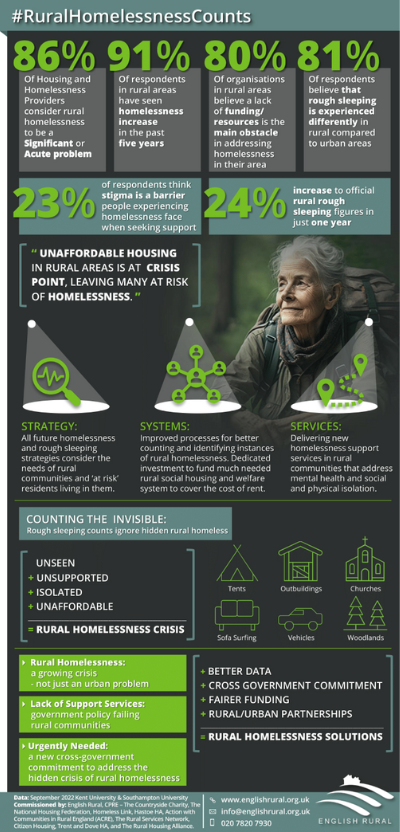Chronic increase of ‘hidden’ homelessness in the countryside fuelled by cost-of-living crisis, ground-breaking report shows
17 March 2023
A year-long study exposes a surge in rural rough sleeping since the pandemic has been worsened by the cost-of-living crisis.
The countryside is battling a ‘hidden homelessness’ crisis driven by soaring housing costs and a gaping shortfall in local authority funding, a new report shows.
The true scale of the crisis is likely to be far higher than the official statistics. The year-long study, which included a survey of 157 frontline support workers, service providers, NGOs, and shelters, found an overwhelming majority thought rural homelessness was a serious problem that was getting worse.
Key findings include:
- 91% of respondents in rural areas have seen homelessness increase in the past five years
- 83% of respondents in rural areas said their job had become harder in the past five years
- 81% of respondents believe that rough sleeping is experienced differently in rural areas compared to urban areas
The study, by academics at the University of Kent and the University of Southampton, on behalf of a coalition of rural charities and housing associations, including Action with Communities in Rural England (ACRE) shows rural areas being paid a fraction of what they need to tackle homelessness in their communities.
Overall, rural local authorities are receiving 65% less in funding per capita through the Homelessness Prevention Grant than urban areas, who are themselves chronically underfunded. The sharp discrepancy in financial aid, discovered in statistics released by the Department for Levelling Up, Housing and Communities, shows urban local authorities were paid £7.15, compared to just £2.50 paid to rural local authorities when calculated on a like-for-like basis.
Interviews with more than 40 people, including people who sleep rough and outreach workers in four rural locations, paint a striking picture of isolation and resilience.
People who experience homelessness in rural areas often sleep rough in farmland or woodland, making them much harder for outreach workers to find and support, and putting their life and health in jeopardy. Real life stories shared with the researchers included people digging trenches in the snow to sleep, going several days without food, being spat on, their tents set on fire, and muggings that resulted in brain injuries and teeth being knocked out.
The study found that isolation also made the problem far worse for those facing homelessness in rural areas, where limited transport options and the absence of support placed them at greater risk. Those with physical or mental health needs were found to be most vulnerable.
Richard Quallington, ACRE’s Executive Director said, “Whilst we are pleased to have been associated with this ground-breaking research, we are shocked at the scale of the issues uncovered. Rural homelessness is a real and growing problem needing focus, resources and collective action.
It’s a real credit that the research has given voice to those who are experiencing homelessness, but these accounts also serve as a damning indictment of our current approaches to tackling this issue. This study marks just the beginning of the journey which needs to involve both the state and civil society working together. It also requires a new cross government commitment and package of funding for affordable housing and support services in rural communities. Without this collective action and resourcing, rural homelessness will continue to worsen.”
The coalition is calling for local and national leaders to make a clear commitment that ‘rural homelessness counts’. They are recommending:
- All future homelessness and rough sleeping strategies consider the needs of rural communities and ‘at risk’ residents living in them.
- Improved processes for better counting and identifying instances of rural homelessness.
- Delivering new homelessness support services in rural communities that address mental health and social and physical isolation.
- Dedicated investment to fund much needed rural social housing and increasing funding through the welfare system to cover the cost of rent.
Notes to editors
This press release was prepared by English Rural and CPRE on behalf of organisations involved in this research. For enquiries about the research, please contact Sam Relph, CPRE Media Relations Lead, at samr@cpre.org.uk or 020 7981 2827 / 07739 332796; or Dave Barrowcliff, English Rural Communications Manager, at david.barrowcliff@englishrural.org.uk or 020 7820 7930.
For comment from ACRE, please contact Phillip Vincent, Public Affairs & Communications Manager, at p.vincent@acre.org.uk, 01285 425645.




